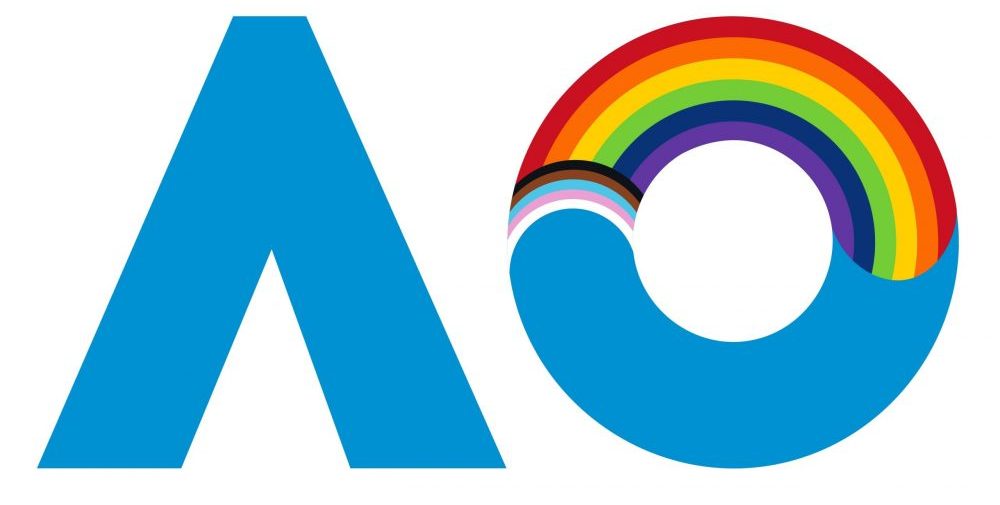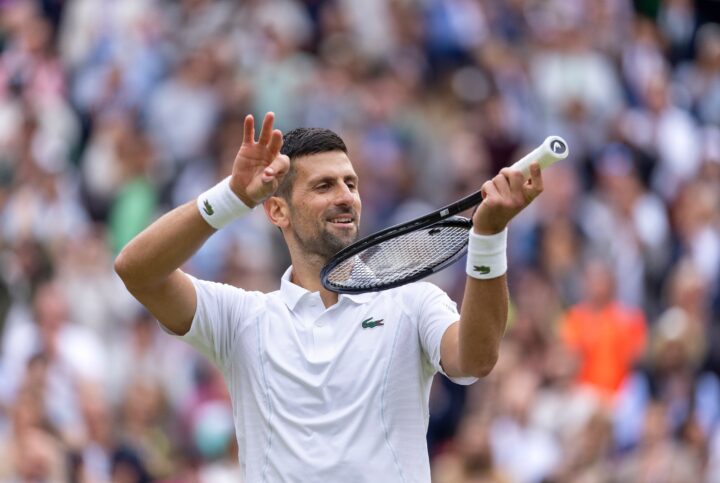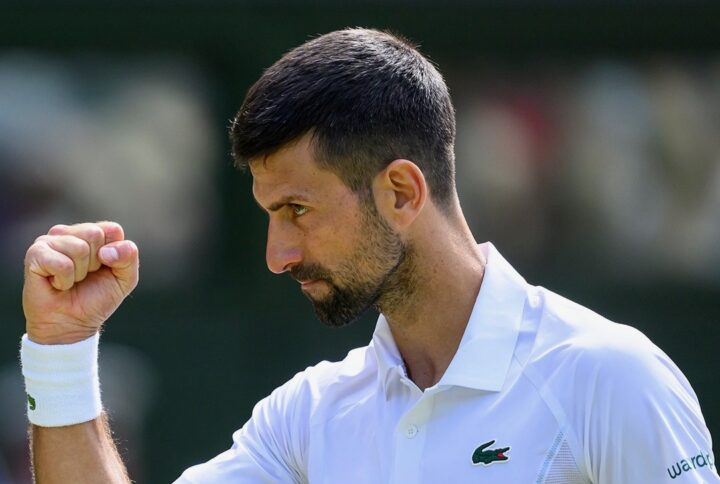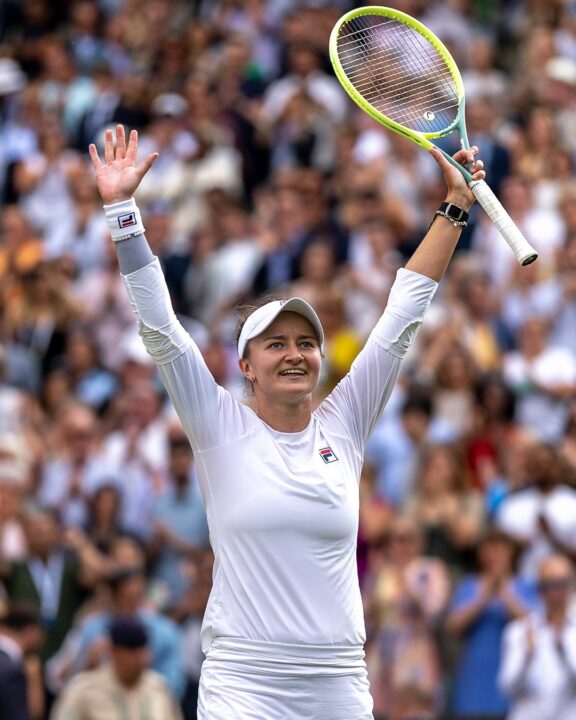Monday at Melbourne Park will see the likes of Stefanos Tsitsipas and Aryna Sabalenka battle for a place in the quarter-finals but taking place during the same time will be a brand new initiative overseen by Tennis Australia.
AO Pride Day celebrates LGTBQ+ players and fans within the world of tennis. The Rod Laver Arena will be lit up in rainbow colors at night, activities will be taking place throughout the day and there will be a various forms of entertainment put on. Courtney Act, who is best known for finishing runner-up in season six of Rupaul’s Drag Race, will be one of the MC’s taking part.
“For many years we’ve hosted special events for the LGBTI community, such as the international Glam Slam and our pre-AO Pride night, so bringing many of our initiatives together on AO Pride Day is the natural next step,” Tennis Australia CEO Craig Tiley said in a statement. “I’m delighted we can all come together as a community to celebrate together on this special day, which I have no doubt will become a highly anticipated part of the AO every year.”
One of those who have been part of launching the initiative is Dr Ryan Storr. A social scientist with an extensive history of researching LGBTI issues in sport. He is a research fellow at Swinburne University of Technology and is the co-founder of Proud 2 Play which seeks to facilitate young people from the LGBTI community into sport and exercise. Storr also has roots in tennis after previously working as a coach at Northumbria University and Loughborough University.
UbiTennis speaks with Storr ahead of Pride Day to find out why such an initiative is important and what he has discovered about LGBTI-related tennis issues through his own academic work. We also look into the debate surrounding the decision to have one of the Australia’s Open primary stadiums named after Margaret Court who has previously made various anti-LGBTI comments.
UBITENNIS: Ryan, You have been involved in some of the pre-work for the first Australian Open Pride day. What has that entailed?
DR STORR: It’s been an ongoing process for quite a while. But it basically meant working with Tennis Australia and their Diversity and Inclusion team. Thinking about planning, what the events are, what the aim is and things like that.
I think one of the things I think I have been particularly helpful with is using the research. I did a big piece of research around the impact of inclusion on LGBTI communities, what can be done and so on.
There have been planning groups, emails, working groups – so a lot of planning has gone into this. It is not a one-off project, it has been building for years and I think this one is going to be the biggest one since it is now sponsored and presented by Ralph Lauren. There has been a lot of community engagement, stakeholder engagement and speaking with the community about what we want with this event.
UBITENNIS: Why is it important to have days like these at the Australian Open and what is the overall objective?
DR STORR: The importance of Pride Day, in addition to the Glam Slam which is happening next weekend, is using Tennis Australia’s reach and brand to raise awareness and to invite people in. So when people might think why do we have Pride Day’s? In the context of tennis it is to try and attract new fans. From research and my own research LGBTI fans from across the globe don’t always feel welcome. Sometimes there is a hostile environment during live sporting events so some people might not think to attend or they think about their safety.
It’s basically marketing to the LGBTI community saying we want you to come to our event and we are inclusive. Unfortunately, if they are not told, some may feel it is not a place for them. Especially trans and gender diverse people who can have challenges in terms of accessing bathrooms etc.
UBITENNIS: In the press release Tennis Australia says the day ‘promises to be both an uplifting and educational day for AO fans on-site.’ What about players, will they be able to participate in some way if they wish?
DR STORR: I think there is educational information that’s being given to players. I know Felix Auger-Aliassime was at the first Nations Day which celebrates indigenous and Torres Strait Islander people in Australia. So I think there are opportunities for people to get involved and find out more.
One of the things in particular which I have been involved in is stories and videos around what Pride means and showcasing people’s experiences.
UBITENNIS: You are an accomplished social scientist and co-founder of Proud2Play inc. Have you discovered any studies which highlight the impact of events such as these within a sports environment?
DR STORR: One thing that stood out to me when I did research is generally the people who take part in the Glam Slam, GLTA (Gay and Lesbian Tennis Alliance) tournaments and who they are marketing at is an older demographic. So for example the LGBTI clubs are probably for people aged 30 and above, but mainly around 40-50. In the time when they were younger a lot places it (homosexuality) was illegal, we had the HIV/AIDS crises and discrimination was very common.
I think it’s gone 360 and we really need to show that sport has changed in particular. That it is inviting and welcoming for people because it has a long history of discrimination.
There has been quite a bit of research, especially on pride Games about attitudinal change. One of the things to note is that one-off events don’t do that much. They raise awareness, but they are not going to solve homophobia and transphobia in sport. One thing to know about Tennis Australia and the Glam Slam is that there are also other events going on leading up to this (Australian Open Pride). But I think this event in particular highlights Pride and some of the challenges.
My research found that playing tennis in inclusive and safe environments significantly improved the lives of LGBTI people. That’s why these Pride Games and Pride Day’s show a significant increase in mental and social health, as well as overall wellbeing.
UBITENNIS: One thing I noticed when the Australian Open posted their Pride video on social media, it brought up the debate over the Margaret Court Arena and whether it should be renamed due to her history of anti-LGBTI remarks. I was just wondering what your opinion on the matter is being both Australian and a member of the LGBTI community?
DR STORR: The Margaret Court Arena is an interesting and complex topic still. I think Tennis Australia has suggested that they would potentially change the name but unfortunately Melbourne Park is owned and run by the Olympic Park Trust. So in order to do that (renamed a court) it needs to be the Olympic Park Trust.
Tennis Australia doesn’t have the naming rights. I think it potentially will change. The name of John Cain Arena has changed a number of times but I think having that name (showcased on an arena) doesn’t show that Tennis Australia is not inclusive.
Tennis Australia is doing so much work behind the scene and investing money. They have invested in research through the University I was working at. There are not many sports who are investing in this.
I think there is going to be a significant evidence-base (data) to show the positive impact of these events in terms of tickets sold, brand awareness etc.
There is an absolute commitment from Tennis Australia in terms of time, resources, energy and funding. This is all-year round and not just when the Australian Open is on.
UBITENNIS: So what does the future hold when it comes to promoting LGBTI issues in tennis considering there is no openly gay player on the men’s Tour?
DR STORR: I think in the coming years there will be a few more bits going on. I have a colleague, Lou, from Pride Sports UK who has been commissioned to initially do some research and insight around LGBTI inclusion.
Tennis is probably welcoming and inclusive in this respect. I wouldn’t say it is like a player couldn’t come out because it is an individual sport which makes a difference compared to team sports. But the proof will be in the pudding when somebody comes out. I think there is going to be a lot more work from the ATP and the other Grand Slams.
Tennis hasn’t really engaged in LGBTI inclusion. You got Martina Navratilova and Billie Jean King but it is important to engage with LGBTI communities moving on into the future.
You can find out more about Storr‘s academic work related to LGBTI issues in sport HERE or follow him on twitter.



 Hot Topics3 days ago
Hot Topics3 days ago
 Latest news3 days ago
Latest news3 days ago
 Hot Topics2 days ago
Hot Topics2 days ago
 Hot Topics3 days ago
Hot Topics3 days ago
 Focus2 days ago
Focus2 days ago
 Focus2 days ago
Focus2 days ago
 Focus2 days ago
Focus2 days ago
 Hot Topics2 days ago
Hot Topics2 days ago






























